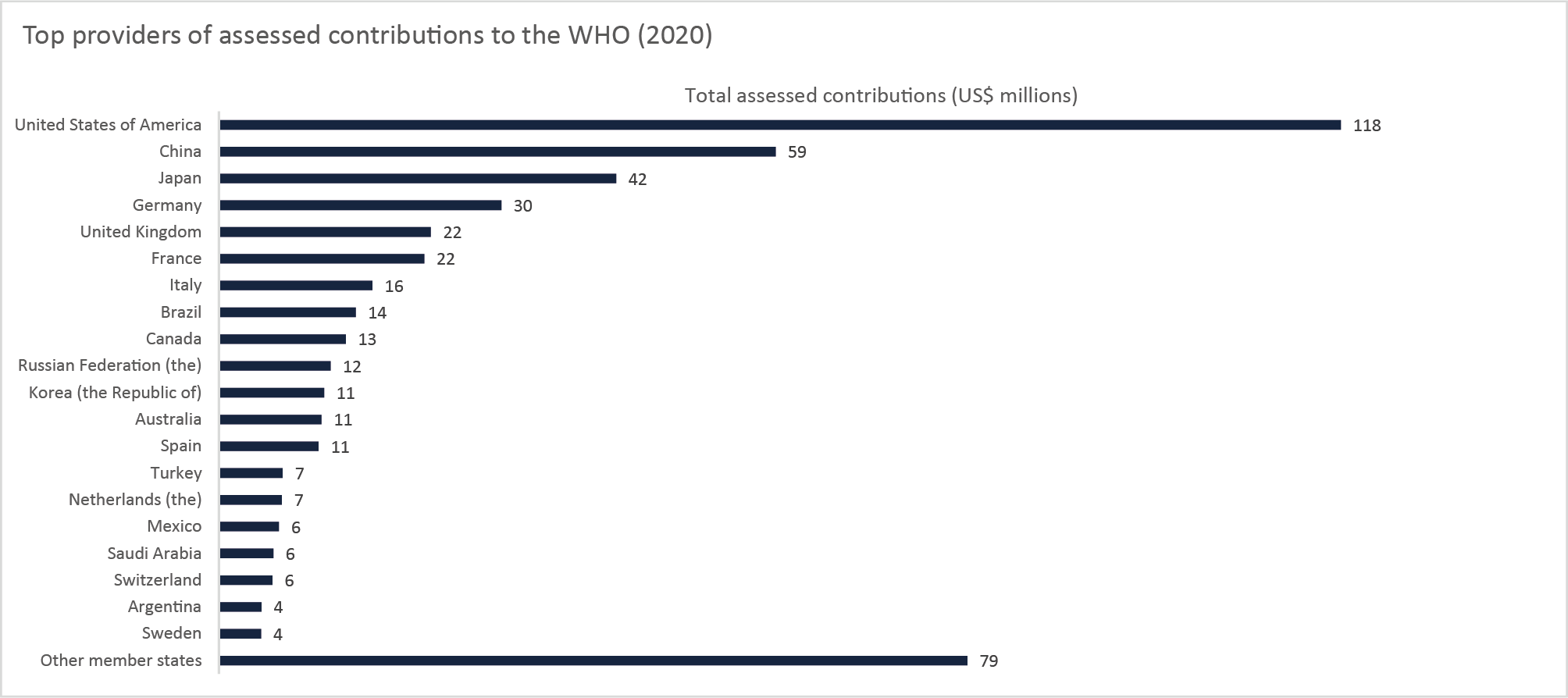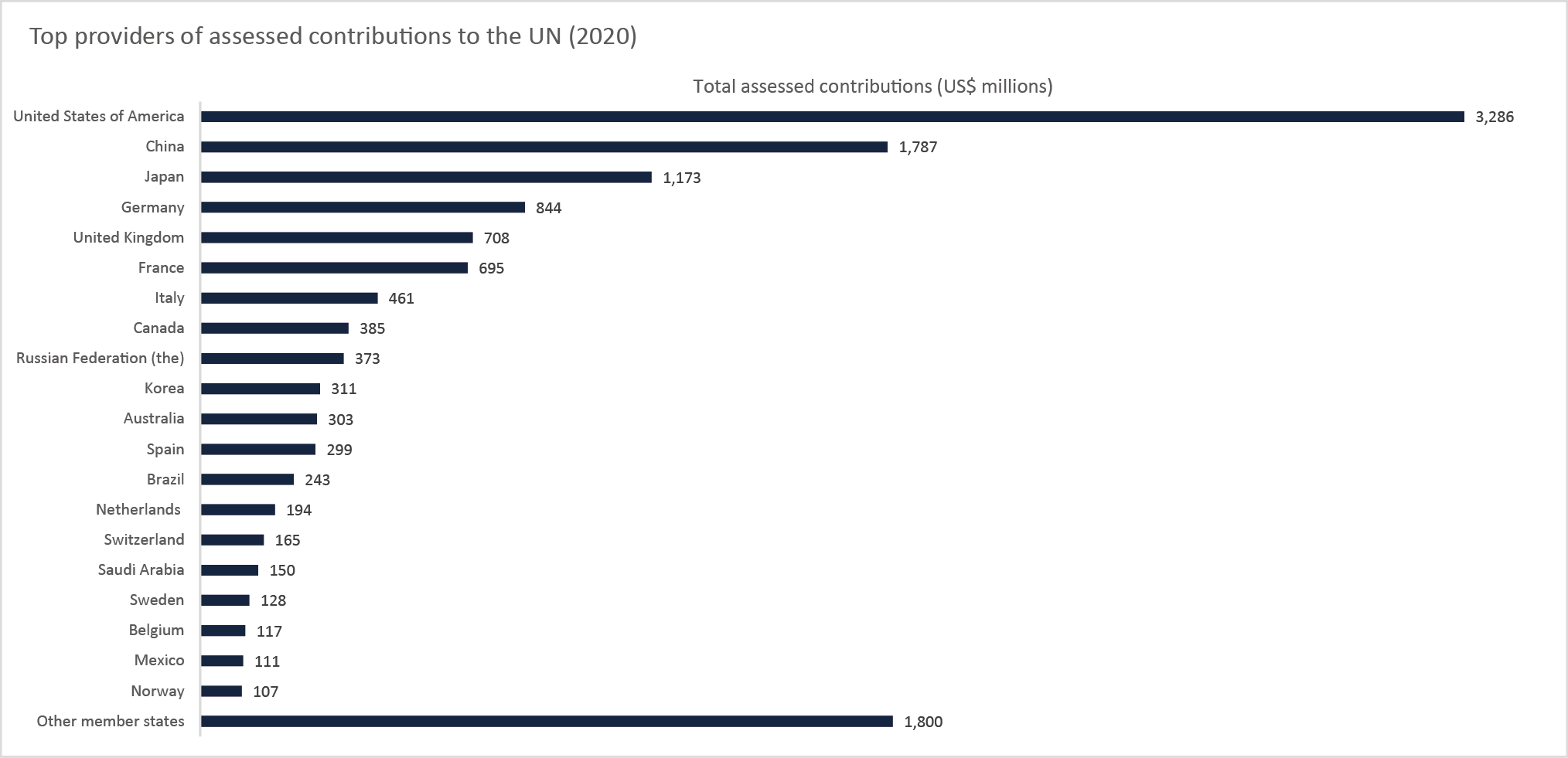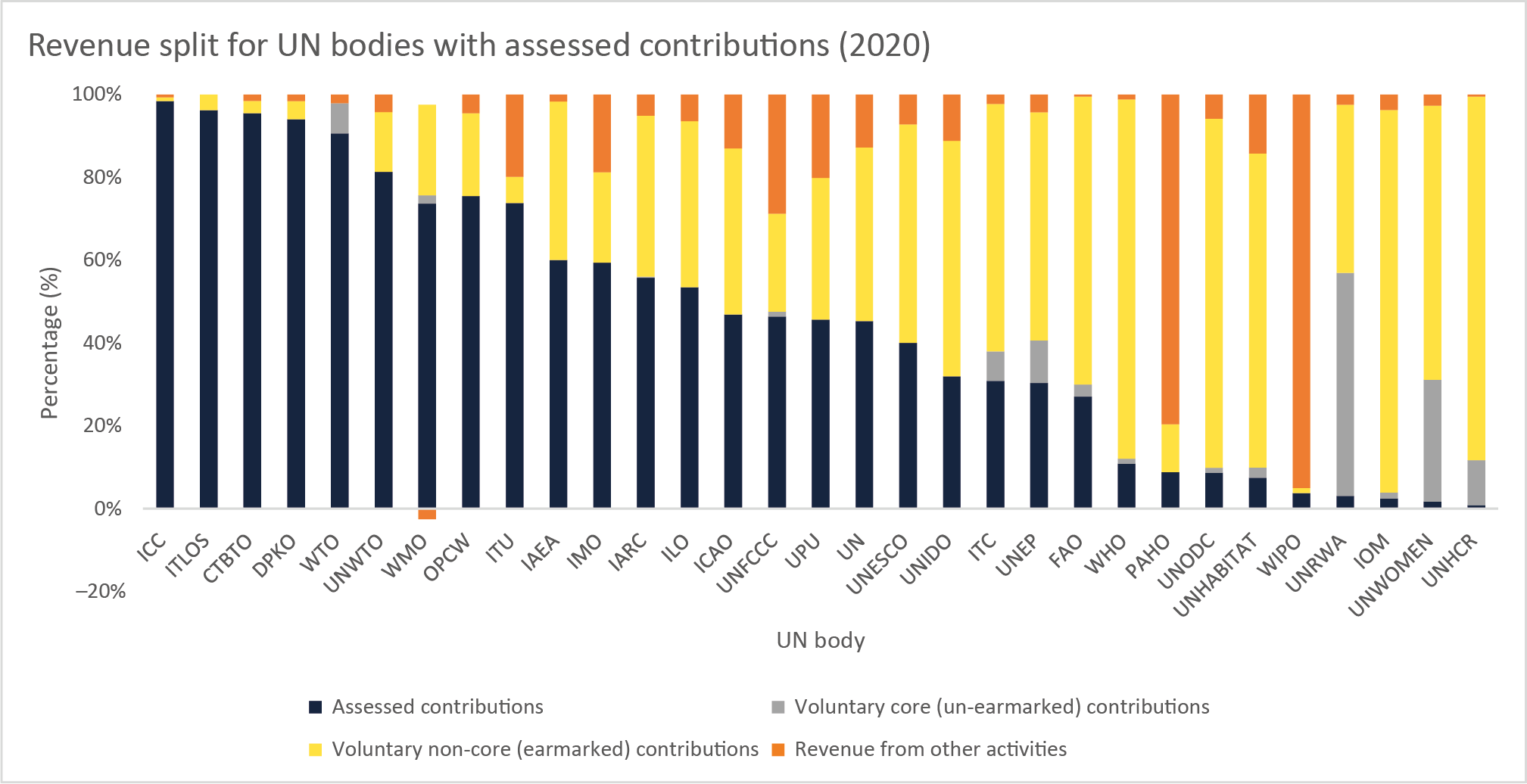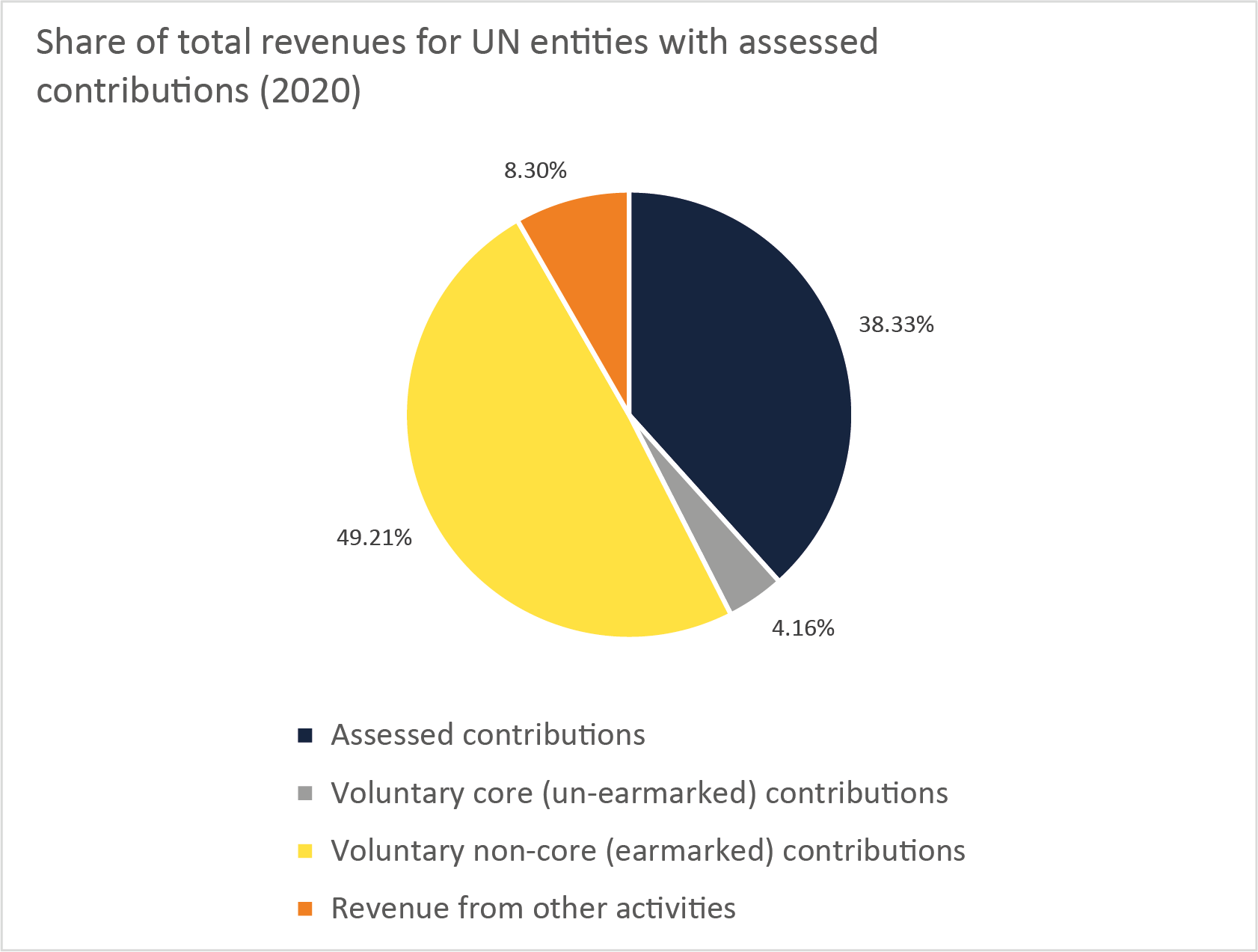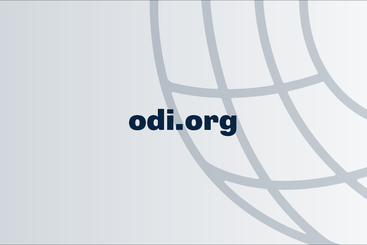Introduction
It is no secret that the World Health Organization (WHO) is grossly underfunded. As its Executive Board meets this week to discuss how it can become the global health institution the world needs and wants, all eyes will be on whether the WHO can finally solve the problem of its precarious financing.
But there is even more at stake in this debate than the WHO’s own financial health. If a financial fix can be found for what ails the WHO, there will likely be ripple effects for the ways member states fund entities across the United Nations system whose funding structures are equally shaky. It is the possibility of these downstream consequences – including the potential liabilities that action at the WHO could place on reform efforts in other UN entities – that is one of the greatest political challenges to fixing the WHO’s balance sheet.
Nevertheless, this is a Pandora’s box worth opening. The lack of predictable and flexible finance for a sickly UN multilateral system is a problem in urgent need of a solution.
The WHO financing debate and its wider relevance for UN entities
If member states are serious about wanting a more effective UN system for managing an expanding list of global challenges, individual entities must be solidly financed to ensure their independent capacity to act. For the WHO, this requires a sustainable source of funding to enable it to fulfill its essential global health functions, including the creation of norms and standards based on the best technical knowledge and evidence, as well as preventing, detecting and responding to disease outbreaks such as the Covid-19 pandemic.
However, only about 16% of the WHO’s $6 billion budget over the biennium 2020–2021 came from a predictable, stable funding source. This regular budget is made up of obligatory member state dues, allocated in a UN formula tabled every three years in the UN General Assembly. This formula weights contributions according to a country’s economic strength and population size, with adjustments made on the basis of income per capita and debt burden and is intended to ensure fair financing obligations across countries of dissimilar means. Currently the formula’s minimum contribution stands at 0.001% of the regular budget, while its maximum contribution is 22%.
Admittedly, the UN scale of assessment is not the only formula for allocating financing responsibilities; there are alternatives. Some UN entities rely on contribution class systems (where states, upon joining the organisation, elect one out of several set contribution classes, which then prescribe the level of membership fees that need to be paid) or methodologies that include mandate-related indicators (for example, the International Maritime Organization includes the size of a member state’s fleet of merchant ships as a variable when calculating contributions). For most UN entities that collect membership fees, however, the UN regular budget’s scale of assessments has been the main reference for calculating obligatory membership fees (Table 1).
The application of this scale sits at the centre of current financing debates at the WHO. In January 2021, a Working Group on Sustainable Finance was set up to explore options and responsibilities for financing the essential functions of the WHO. A key proposal discussed by the Working Group involved doubling members’ assessed contributions from their 2022/23 levels, starting in 2024 and gradually increasing until 2028–2029. This would break with an approach that has essentially frozen the WHO’s regular budget since the 1980s. Although the Working Group’s proposal was less than the 66% increase in member state fees proposed by the Independent Panel for Pandemic Preparedness and Response earlier this year, no consensus was reached on the recommendation.
|
Formula based on the UN Scale of Assessments |
United Nations (UN) regular budget, as well as the following UN entities: Comprehensive Nuclear-Test-Ban Treaty Organization (CTBTO)**; Food and Agriculture Organization (FAO)**; International Atomic Energy Agency (IAEA)**; International Criminal Court (ICC)***; International Labour Organization (ILO)**; International Organization for Migration (IOM)**; International Tribunal for the Law of the Sea (ITLOS)**; Organisation for the Prohibition of Chemical Weapons (OPCW)**; UN Department of Peacekeeping Operations (DPKO)***; UN Educational, Scientific and Cultural Organisation (UNESCO)**; UN Entity for Gender Equality and the Empowerment of Women (UN Women)*; UN Environment Programme (UNEP); UN Framework Convention on Climate Change (UNFCCC)**; UN High Commissioner for Refugees (UNHCR)*; UN Human Settlements Programme (UN-Habitat)*; UN Industrial Development Organization (UNIDO)**; UN Office for Drugs and Crime (UNODC)*; World Health Organization (WHO)**; World Meteorological Organization (WMO)** |
|---|---|
| Formula partially based on the UN Scale of Assessments |
International Agency for Research on Cancer (IARC); International Maritime Organization (IMO); International Trade Centre (ITC) |
|
Other formula, including classes of contribution and mandate-specific indicators |
International Civil Aviation Organization (ICAO); International Telecommunication Union (ITU); Pan-American Health Organization (PAHO); UN World Tourism Organization (UNWTO); Universal Postal Union (UPU); World Intellectual Property Organization (WIPO); World Trade Organization (WTO) |
Many European and African states believe funding reform is critical, given the WHO’s key role in global health security. Nevertheless, there is perhaps some reason to worry about the precedent the decision might set for the financing of other UN entities, particularly the burdens it might place on larger providers (Figures 1a and 1b). High resistance was initially indicated from the United States, Russia, Japan and Brazil. China's position was more ambivalent, while Russia appears to now be supporting the proposals. This week, the WHO Executive Board will be reviewing the Working Group’s deliberations. The hope is that the group's proposals will be taken forward even though no consensus was reached, or at least that its mandate to explore WHO financing reform will be prolonged.
Figure 1a
Figure 1b
Unfortunately, the WHO’s unsustainable funding situation is not unique. Of the 31 UN organisations receiving assessed contributions in 2020, 18 received more than half their total revenues from other sources (Figure 2). As a general pattern, forum organisations that predominantly set global rules and support decision-making – such as the World Trade Organization – are funded mainly by assessed contributions. Organisations like the WHO, which also engage in operational activities on the ground, rely to a large degree on voluntary sources of funding (the one notable exception being peacekeeping). If the Executive Board doubled assessed contributions at the WHO, this would challenge the zero-growth approach to assessed funding in other UN institutions carrying out critical work in areas like human rights, environmental degradation, food security and education.
Figure 2
Problems and pitfalls of voluntary funding
Over the last decade, voluntary contributions have turned into an important source of funding for many UN entities, because they carry more immediate benefits for states in comparison to assessed contributions. More than half of all UN funding in 2020 came in a voluntary fashion, with donors influencing the timing of investment and the size of the envelope. Of this, over 90% was earmarked to specific themes or geographies, rather than provided flexibly as core support (Figure 3). At the WHO, earmarked voluntary contributions made up over 85% of total 2020 revenues (Figure 2).
Figure 3
Voluntary contributions, including earmarked ones, have their reason for existing. They are meant to allow UN humanitarian and development entities to carry out their mandates, providing a strong orientation towards results and donor accountability, fostering innovation and inducing UN entities to work together.
Nevertheless, excessive reliance on voluntary funding also has costs, especially when earmarking distorts institutional priorities, reduces flexibility to respond to emerging needs, and makes long-term planning difficult. It can undermine the voice and representation of less wealthy members, giving greater leverage to those who pay more, including non-state actors. This can endanger institutional independence and integrity, as some suggest is occurring at the WHO where the Bill and Melinda Gates Foundation was the second-largest donor over the 2020–2021 biennium. The Gates foundation provided the WHO with more funds than the US and China combined (though some say this was atypical and driven by the funding gap left by President Donald Trump’s move to withdraw from the WHO in 2020). Sizeable voluntary funding can also reduce institutional focus, hollow out the core competencies of multilateral institutions that are not as appealing to individual donors, and fragment the governance of the multilateral system.
However, voluntary contributions remain an important resource stream for the UN system. The proposal under discussion at the WHO does not question their utility, but rather, seeks to reduce the institution’s reliance on them.
Assessed contributions: less influence for states, more autonomy for organisations
Assessed contributions provide flexible and reliable funds and can ensure a UN entity’s institutional independence. Nevertheless, they are by no means a cast-iron guarantee for a solidly financed multilateral organisation.
On the one hand, this is because member states can have low incentives to pay their dues. In January 2022, only 31 out of 193 states had made the UN ‘honour roll’ comprising members that paid their regular budget assessments in full and on time. At the WHO, 2020 arrears are estimated to be a fifth of its annual budget.
Sometimes, politics induces threats to withhold assessed dues, as was the case when President Barack Obama threatened to withdraw the US from UNESCO in 2011, when the organisation granted membership to Palestine. Withholding contributions constitutes a breach of the collective duty, according to membership statutes. Nonetheless, the UN has been on the brink of insolvency several times because member states withhold their mandatory payments, pay late, or do not pay the full amount due.
States understand the disadvantages of assessed contributions. Late payment and the withholding of UN dues arguably come with greater reputational costs for governments than a cessation of voluntary funding, because they risk the loss of voting rights in governing bodies.
Moreover, unlike voluntary contributions, obligatory contributions to the core budget give no formal advantage to larger donors in terms of control, attribution or accountability. This is because core institutional priorities are set by member states with equal representative status at the UN and are not dependent on the size of members’ budgets, as is the case for the World Bank and the International Monetary Fund. Assessed contributions provide no added leverage to member states in navigating UN processes, which makes negotiations more challenging and more demanding of patience and active compromise.
While assessed contributions provide more natural limits to unilateral influence than voluntary funding, they do not stop power politics from influencing programmatic and budget decision-making. Increasing geopolitical tensions complicate the picture further. While China’s future economic growth is difficult to predict, some estimate that the country will have a regular budget share at the UN matching that of the US as soon as 2028. The geopolitics of this growing Chinese clout are mixed. On the one hand, China's increasing share of the UN’s regular budget potentially lowers the budget burdens of others. On the other hand, it also signals to the US and its Western allies rising Chinese influence at the UN, even if assessed contributions arguably protect global institutions from individual member state preferences and priorities.
What's really needed? Steps towards fixing UN financing
This week's WHO Executive Board discussions raise the possibility of a frank and wider debate on solutions to the endemic problem of unsustainable financing in the UN system. There are several ways to build on this opportunity and take the UN financing reform agenda forward.
1) Increase the share of assessed contributions to the WHO
A strong case can be made that increasing the share of assessed contributions in the WHO’s budget during a global pandemic is a singular and necessary measure. Such an increase would not automatically lead to increases in regular budgets in other UN entities, especially if the WHO’s vital functions in the context of a pandemic are an integral part of the rationale for doing so. The world needs a stronger, more flexible and more independent WHO now more than ever, and increasing the share of assessed contribution is a concrete – and necessary – step towards this goal. Extending the term of the Working Group on Sustainable Finance, and working with the German G7 Presidency, which is aiming to strengthen global health architecture and finance, could allow real progress to be made on this issue.
2) Link discussions on UN funding reform to its desired global functions
Member states could and should use budgetary and reform discussions at the WHO to strengthen the link between funding and functions across the UN system. There is no need to start from scratch; recent discussions within the UN development system and the funding compact provide a good starting point, with the WHO serving as a role model. While the functional expectations of multilateral organisations will always face political imperatives, the WHO example offers an opportunity to articulate the desired global governance functions of UN entities, and the different forms of funding needed to actually implement them. This discussion adds a hitherto missing dimension to the UN Secretary-General’s recent report ‘Our common agenda’ and should become part of the follow-up process.
More generally, member states should engage in an explicit debate about which UN functions assessed contributions provide the best revenue stream for, and where other forms of funding – replenishments, fees, negotiated pledges, soft and hard earmarking – are more appropriate. For example, supplementary financing for less essential functions might draw inspiration from replenishment models, which are increasingly used in stand-alone global funds. This can raise core voluntary funds over the medium term, providing a degree of income predictability and expanding the range of supporters beyond governments. Blending financial models and creating new ones based on an inventory of the UN’s functional needs offer a promising avenue for plugging resource gaps.
3) Make the formula for assessed contributions fit for purpose
While different components of the UN assessment scale have evolved since the 1940s, for the last 20 years the formula has been remarkably unchanged. To ensure it remains fit for purpose in the context of profound global power shifts and transnational challenges, member states should revisit the basic formula and explore the possibility of adding indicators to the scale of assessments for specific UN institutions. Integrating issue-specific dimensions into the regular budget formula of individual entities – such as climate change vulnerability, carbon neutrality or being host to large populations of refugees, for instance – could help strengthen the perception of assessed contributions as both appropriate and fair. This would add a merit-based element into the question of who absorbs the costs of global governance.
Undoubtedly, any change to the formula will be controversial, as it will shift the distribution of costs among member states at a time of extreme geopolitical sensitivity and fiscal constraint. But the prospect of doing so also throws some thorny issues into the spotlight. For example, should the cap of 22% (the ceiling that limits the assessed contributions of any member state) be significantly lowered to reduce reliance on larger states like the US? On the other hand, does it make sense to give larger financial responsibilities to the five permanent Security Council members, as is the case with peacekeeping formulas? It is worth addressing such questions sooner rather than later, given that the necessary intergovernmental consensus will become even harder to reach once the sums to which it applies become more significant.
4) Penalise arrears
One of the main challenges of the UN’s current assessed contributions system is that a small but significant number of member states are not motivated to pay their dues. To counter such ‘low payment morale’, a more comprehensive set of mechanisms should be considered to increase timely and full compliance with assessed contribution obligations.
For example, lowering the threshold beyond which member states lose their voting rights at UN assemblies if they do not pay their dues, or do not pay on time, would tighten sanctions for non-payment. Alternatively, the assessed contribution formula itself could be adapted by using a variable that factors in past payment performance when calculating budget allocations. Throughout, a more explicit distinction should be made between member states’ inability to pay – in the case of emergency situations in Least Developed Countries, for instance – and an unwillingness to pay for geopolitical or other reasons.
In a context of existential transnational challenges and growing inter-state rivalries, we need well-financed, universal multilateralism that can set global rules and norms, drive forward action, and sidestep the tendency for money and military might to buy global influence. The WHO Executive Board now has an opportunity not only to reinvigorate its own organisation, but also to advance a discussion on how the entire UN system can be placed on a stronger, more financially sustainable footing. Passing up this moment out of fear of the implications for member state fiscal obligations to the wider UN system would be both unfortunate and short-sighted.
